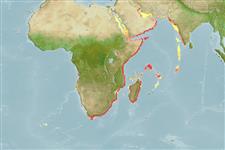>
Eupercaria/misc (Various families in series Eupercaria) >
Haemulidae (Grunts) > Haemulinae
Etymology: Pomadasys: Greek, poma, -atos = cover, operculum + Greek, dasys = with hair (Ref. 45335).
Eponymy: Dr Philibert Commerson (1727–1773) was known as ‘doctor, botanist and naturalist of the King’. [...] (Ref. 128868), visit book page.
More on author: Lacepède.
Environment: milieu / climate zone / depth range / distribution range
Ecología
marino; salobre asociado a arrecife; oceanodromo (Ref. 51243); rango de profundidad 0 - 49 m (Ref. 122701). Tropical; 31°N - 37°S, 18°E - 77°E
Distribución
Países | Áreas FAO | Ecosistemas | Ocurrencias, apariciones | Point map | Introducciones | Faunafri
Southeast Atlantic and Western Indian Ocean: Western and Eastern Cape, South Africa, East Africa, Persian Gulf, Socotra, Seychelles, Madagascar to northwest coast of India.
Length at first maturity / Tamaño / Peso / Age
Maturity: Lm 38.0 range ? - ? cm
Max length : 80.0 cm TL macho / no sexado; (Ref. 2799)
Short description
Claves de identificación | Morfología | Morfometría
Espinas dorsales (total) : 10 - 11; Radios blandos dorsales (total) : 14 - 15; Espinas anales: 3; Radios blandos anales: 9 - 10. Juveniles without spots on body (Ref. 2799).
Found in coastal waters, estuaries, and tidal fissures; can tolerate freshwater. It can jet a stream of water into the mud to expose crustaceans, worms and small bivalves which it feeds on (Ref. 11441); including fish (Ref. 5213). Tasty food fish (Ref. 2799). Maximum depth range from Ref. 122702.
Life cycle and mating behavior
Madurez | Reproducción | Puesta | Huevos | Fecundidad | Larva
Oviparous, distinct pairing during breeding (Ref. 205).
Smith, M.M. and R.J. McKay, 1986. Haemulidae. p. 564-571. In M.M. Smith and P.C. Heemstra (eds.) Smiths' sea fishes. Springer-Verlag, Berlin. (Ref. 2799)
IUCN Red List Status (Ref. 130435: Version 2024-1)
Threat to humans
Harmless
Human uses
Pesquerías: comercial; pesca deportiva: si
Herramientas
Special reports
Download XML
Fuentes de Internet
Estimates based on models
Preferred temperature (Ref.
123201): 22 - 27.9, mean 26.8 °C (based on 146 cells).
Phylogenetic diversity index (Ref.
82804): PD
50 = 0.5000 [Uniqueness, from 0.5 = low to 2.0 = high].
Bayesian length-weight: a=0.01905 (0.01223 - 0.02969), b=2.95 (2.82 - 3.08), in cm total length, based on LWR estimates for this species & Genus-body shape (Ref.
93245).
Nivel trófico (Ref.
69278): 3.5 ±0.2 se; based on diet studies.
Generation time: 5.8 ( na - na) years. Estimated as median ln(3)/K based on 2
growth studies.
Resiliencia (Ref.
120179): Bajo, población duplicada en un tiempo mínimo de 4.5-14 años (K=0.07-0.42).
Fishing Vulnerability (Ref.
59153): Low to moderate vulnerability (34 of 100).
Nutrients (Ref.
124155): Calcium = 31 [11, 60] mg/100g; Iron = 0.547 [0.284, 0.949] mg/100g; Protein = 19.9 [18.0, 21.6] %; Omega3 = 0.135 [0.076, 0.229] g/100g; Selenium = 37.4 [22.7, 67.5] μg/100g; VitaminA = 39.3 [14.1, 108.1] μg/100g; Zinc = 1.06 [0.74, 1.61] mg/100g (wet weight);
